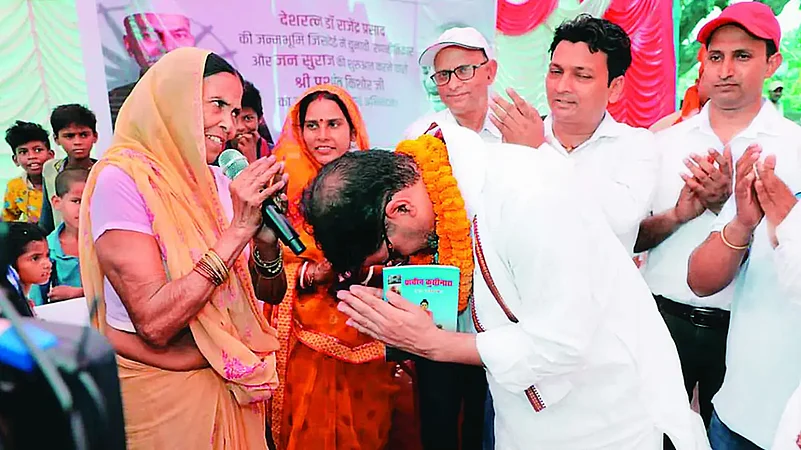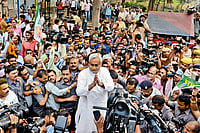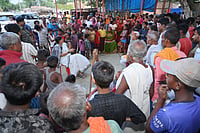Indian Political Action Committee (I-PAC), the election management company whose office is located on Exhibition Road in Bihar’s capital Patna, is abuzz these days. Around 150 youths who have studied in different institutes are working at the office for its new client in Bihar—company founder Prashant Kishor, popularly known as PK. I-PAC has been assigned to manage the Jan Suraaj campaign, launched by PK in May this year.
From promoting the organisation with a strong presence on social media, the team is working to connect people with the organisation at the district, block and panchayat levels. PK has himself visited nine districts so far, during which he met local people and held press conferences to address local media’s queries.
A member of the team managing the Jana Suraaj campaign, on condition of anonymity, says, “Prashant Kishor will go on a 3,000-km padyatra, starting October 2. For this, 3-4 teams are working at different levels—on where he will go, whom he will meet, routes he will follow, where he will stay, etc.” He adds, “Kishor will also finish touring Bihar’s remaining 19 districts before starting on the padyatra.”
Kishor’s team is trying to connect with people who have already contested for the posts in panchayats, Zilla Parishads, wards, etc, as well as independent candidates who had contested past state legislative elections.
The journey so far
Born in south Bihar, Kishor (45) started his career as election manager in 2011 from Gujarat, while working for Narendra Modi. In 2013, he founded a publicity company named Citizen for Accountable Governance (CAG) and took the responsibility of formulating the campaign strategy for the BJP in the 2014 Lok Sabha elections. After the BJP’s historic victory, he did not look back.

In 2015, he managed the Bihar assembly elections for the Janata Dal (United). It was probably then that he started seriously thinking about Bihar. Nitish Kumar’s victory in 2015 brought PK closer to Kumar, who appointed PK as his advisor. But he could not stay in this post for long because in the meantime, his newly-formed company, I-PAC, had started working for other political parties.
In 2018, he returned to Bihar. This time, the JDU made him its vice-president. But his stay was short. By 2020, angry over Prashant’s scathing remarks on Nitish Kumar’s lax view on CAA-NRC, the party removed him from the post.
He returned to election management, only to return to the headlines around two years later, when he announced he would launch his political career from Bihar. On May 2, he tweeted, “My quest to be a meaningful participant in democracy and help pro-people policy led to a roller-coaster ride! As I turn the page, time to go to the Real Masters, THE PEOPLE, to better understand the issues and the path to Jan Suraaj people’s good governance.”
Though yet to float a political party, PK says his Jan Suraaj organisation is a campaign to raise awareness on what good governance should be. In a press conference on May 5, he said, “I had announced I would quit election management in May 2021. After that, I thought for a year and then decided to come to Bihar. I am repeating what I had said when I started the Baat Bihar Ki campaign in 2020—you will see me as a political activist in Bihar in the years to come.”
The Baat Bihar Ki campaign was launched in early 2020. At that time, PK had said it was to raise Bihar to among the top 10 Indian states within 10 years. Responding to his invitation to the youth to join the campaign, over 11.90 lakh youths have registered themselves with the group so far.
Political space in Bihar
According to sources, he may launch his party after the end of the padyatra. But questions are already being raised about what its prospects are in Bihar, and the ideology it would follow. So far, in press conferences and meetings, he only talks of Gandhian philosophy, while raising issues like employment, water, electricity, education, health, etc, and criticising 30 years of governance by Lalu and Nitish.
He is silent on Bihar’s perennial questions of caste and religion though, claiming that if an issue, narrative or leader captures society’s imagination, they do not consider these while voting. “Many elections have been held in which votes were cast on the basis of caste. When there is no narrative or issue, and all parties in the fray look the same—society votes on caste. But if people are impressed with narratives, issues or a person, they will certainly vote above caste,” he said, adding that his party won’t encourage leaders of any specific caste. “Every caste has good people. We’ll bring good people of different castes on one platform”.
Till now, PK’s interviews and the campaigns for Jan Suraaj indicate he wants to do issue-based politics that are not influenced by caste or religion. Senior Patna-based journalist and former editor Chandan says, “The essence of what he has said so far is that he wants to launch a platform that attracts the public on the basis of issues rather than caste or religion. However, it is not easy to mobilise voters only on development. Because, in Bihar, both political groupings have a high number of MLAs, indicating the public is attracted towards them.”
The BJP, which banks on Hindutva, has 77 MLAs, while the Rashtriya Janata Dal (RJD) and the JDU, both of which advertise themselves as socialists, have 80 and 45 legislators, respectively. The JDU is running the Bihar government in partnership with the BJP.
“It is difficult to inspire people to vote over caste and religious fanaticism. If he can do that, he can succeed,” Chandan says. Experts feel PK wants to replicate AAP’s (Aam Aadmi Party) formula of issue-based politics in Delhi, but contend that it may not be possible in Bihar. Analyst D.M. Diwakar says, “Bihar is different from Delhi. People of Delhi are not governed by identity, but in Bihar, identity is dominant and voters are used to considering caste before voting. This is why all political parties give tickets keeping the caste equation in mind.”
So far, there is a mixed reaction about PK’s latest moves among the public. Dr. Mukesh, who participated in PK’s meeting in Vaishali district, says, “There are people who are searching for a third option. If Jan Suraaj gives that, we’ll certainly go with him.” A participant at the meeting in Siwan, on condition of anonymity, said: “I’ll wait until he floats his agenda and ideology.”
(This appeared in the print edition as "Cranes Are Flying")
(Views expressed are personal)
Umesh Kumar Ray is a freelance journalist



























